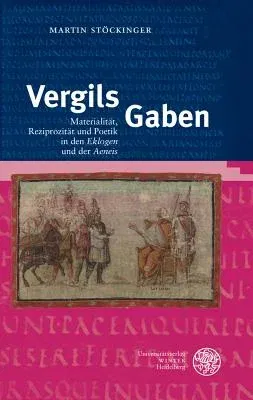English summary: Objects, which change hands as gifts, insignia,
collateral or loot, and as part of reciprocal social processes, are
found throughout the works of the Roman poet Virgil, especially in the
"Eclogues" and the "Aeneid." While previous investigations into this
subject have opened up these literary sites in terms of historical
discourse, or with a view to their literary predecessors in the Archaic
and Hellenistic periods, in this study the structural-poetic meaning of
the gifts are worked out in dialogue with cultural and literary
approaches. Thus, the pastoral monologue is brought into union with the
gift-giving strategies of largesse, and the bucolic antiphony is
clarified with the techniques of excess and balance. In the "Aeneid,"
the social investment in the embedded narratives, and the "Biography of
the Thing," merit particular attention, but also questions concerning
the narrative motivation of "enclosure" (closure) and the "transfer of
religion" (translatio religionis), in their respective connections to
material gifts, are given specific consideration. These different
aspects are merged in an analysis of the shield, which Venus gives to
her son Aeneas. Materiality and reciprocity prove to be integral
components in Virgilian poetics. German description: Gegenstande, die
als Geschenke, Insignien, Pfand oder Beute ihre Besitzer wechseln, und
reziproke soziale Vorgange finden sich in Vergils Werken, insbesondere
in den 'Eklogen' und der 'Aeneis', aller Orten. Wahrend bisherige
Untersuchungen diese Stellen diskurshistorisch oder mit Blick auf ihre
archaischen und hellenistischen Vorlagetexte erschlossen haben, wird in
dieser Studie im Dialog mit kultur- und literaturwissenschaftlichen
Ansatzen die strukturell-poetische Bedeutung dieser Gaben
herausgearbeitet. So wird der pastorale Monolog mit Schenkstrategien der
Verausgabung in Verbindung gebracht und der bukolische Wechselgesang mit
Techniken der Ubersteigerung und des Ausgleichs erklart. In der 'Aeneis'
verdienen die soziale Einbettung der Binnenerzahlungen und die
'Biographie der Dinge' besondere Beachtung, aber auch Fragen der
narrativen Motivierung, der 'closure' und der 'translatio religionis' in
ihrem jeweiligen Bezug zu den Gaben. Zusammengefuhrt werden diese
verschiedenen Aspekte in einer Analyse des Schilds, den Venus ihrem Sohn
Aeneas uberreicht. Materialitat und Reziprozitat erweisen sich so als
integrale Bestandteile der vergilischen Poetik.

